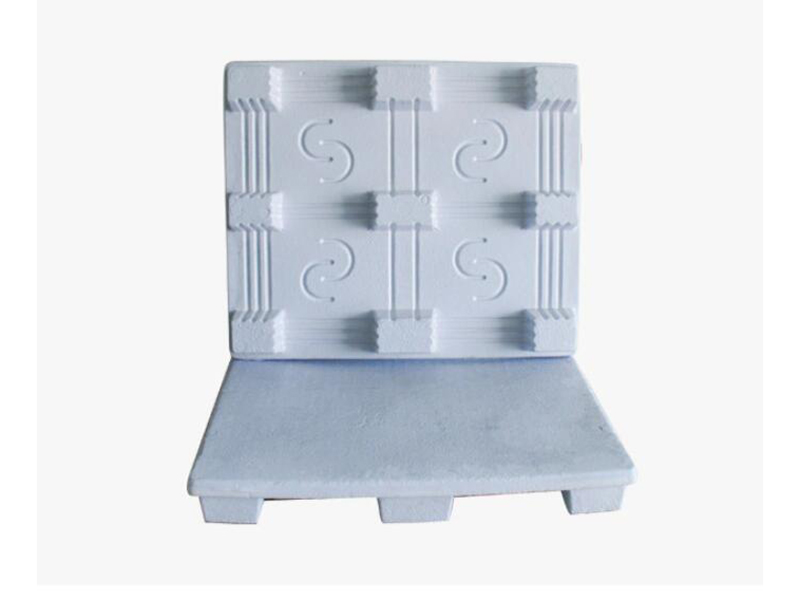Engel announced a cooperation agreement with Glassomer to jointly develop new applications for that company’s glass injection molding, providing a press for research and order fulfillment.
Injection molding machine and automation supplier Engel announced a cooperation agreement with Glassomer GmbH (Freiburg, Germany) to help advance that company’s patented technology for injection molding transparent glass parts on standard plastics injection molding machines. PLA Sheet Thermoforming Machine

Starting with a mix of silica and a polymer binder that’s extruded into a flexible filament and cut into pellets, Glassomer’s technology allows parts to be molded from the pellets, with a water-based debinding technique applied to remove the polymer binder from the molded parts. Once debinded, the parts are then sintered, resulting in clear components that possess the same properties as commercial fused silica glass. Glassomer says the binder it developed allows parts as thick as 15 mm to be created. Sintering, which occurs at 1300°C, creates fused silica parts that are fully dense and highly transparent, with those properties achieved at a lower temperature than traditional manufacturing processes for transparent fused silice glass. Glassomer says shrinkage in the material is isotropic and can be reliably calculated.
Founded in 2018, Glassomer says its technology is particularly applicable for the optical, medical technology, solar, chemical and automotive sectors, with the promise of higher volume mass production. The company’s initial technology targeted 3D printing with a liquid resin matrix, but with the new injection molding grades, the plastic-glass blend can be molded at temperatures of 130°C and with a cycle time of less than 20 seconds.
An Engel spokesperson told Plastics Technology that Glassomer’s technology requires no alterations to the press. The only requirement is for a high precision machine. To that end Glassomer was provided an all-electric e-motion 50 TL injection molding machine from Engel, equipped with an integrated viper linear robot in cleanroom design.
Engel says the e-motion TL machine series was originally developed for the production of PC and COC smartphone camera lenses. “In optics, the light sources being produced are becoming smaller all the time; this, in turn, means higher and higher energy densities, which necessitate the production of fine lens structures in glass with high chemical and thermal stability,” Clemens Kastner, Product Manager Technologies at Engel said in a release, explaining why his company is interested in working with glass as a material.
Glassomer notes that silica glass has long been known for its excellent optical properties, yet processing and forming traditionally requires high-temperature methods and/or hazardous chemical materials. Normal transparent glass has a high melting point, but that temperature is even higher when the transparent glass is made of fused silica. Because of that, transparent glass today is mostly shaped via melt processing, grinding or etching — none of which allows high-throughput replication.
Glassomer’s answer was liquid glass made from a viscous amorphous silica nanocomposite, which it initially developed for 3D printing, creating high-optical-quality glass structures with features as small as a few tenths of a micron. As the material was further developed, it was proven that it could be milled, turned, laser-machined or processed in CNC machines like a conventional polymer.
On Sept. 14, 2020, the company filed for a European Patent with applicants listed as Glassomer GmbH and Albert Ludwigs Universität Freiburg. That patent referenced an earlier U.S. patent filed by Corning covering injection molding of a compounds that’s comprised of an organic binder, a glass powder and a wax, with debinding and sintering used to finish the “green” molded part.
In its patent, Glassomer says that based on the size of the glass powder used and the relatively low density of other glass molding technology, the resulting component’s wouldn’t be transparent. Its technology utilizes a nanocomposite material comprised of an organic thermoplastic binder matrix with glass particles dispersed within that’s solid at room temperature and can be molded. Subjected to an external stimulus, like molding, the patent notes that the organic thermoplastic binder matrix only softens but does not undergo any chemical reaction.
Read: Energy Efficiency in Focus at K 2022
The spherical glass particles in Glassomer’s technology have two diameter ranges from 5 to 500 nm, with 7 to 400 nm preferred, and from 2 to 50 µm, with 2 µm to 40 µm preferred. Glassomer says the smaller diameter glass particles fill in the gaps between the larger diameter glass particles, allowing denser packing. Glassomer says this results in less shrinkage during the sintering step.
Engel and Glassomer are working together on the industrial implementation of glass injection molding technology, with the first sample inspections for series production applications already taking place on Glassomer’s new production floors in Freiburg.
Glassomer and Engel representatives mark the cooperation agreement. From left to right: Rudolf Ehrenweber, head of sales teletronics at Engel; Frederik Kotz-Helmer, Glassomer CSO; Dorothea Helmer, Glassomer CEO; and Clemens Kastner, Engel product manager. Photo Credit: Engel
At the world’s premier plastics fair, Engel will emphasize sustainable processing assisted by digitalization.
Certified and registered within the Commonwealth of Pennsylvania, the program lasts four years with a combination of on-the-job experience and classroom-based instruction.
Promoting from within, Engel North America’s four-person board will be headed by North American CEO Mark Sankovitch, while Engel Group names new CTO and CFO.

automatic-cutting-machine © 2023 Gardner Business Media, Inc. Privacy Policy [Log On]